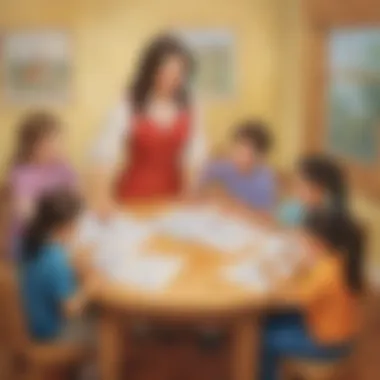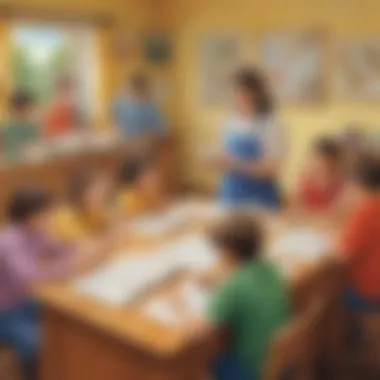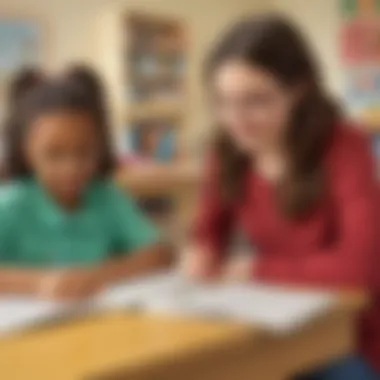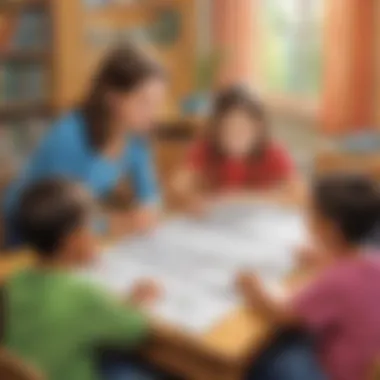Unlocking the Potential of 3rd Graders on Kidlect with Innovative Teaching Strategies


Interactive Learning Games
Playing engaging games can provide a two-fold benefit of entertainment and education. Children especially find interactive learning games captivating, making them an effective tool for refining cognitive skills. Through the Kidlect platform, a wide array of popular educational games cater to various academic areas such as math, science, and language arts. These games are designed to stimulate young minds while bolstering core learning objectives. Game Reviews delve into the specifics, offering insightful critiques on how gameplay impacts the acquisition of new knowledge. Comparisons of different games can shed light on the distinct ways they facilitate learning outcomes, aiding in selecting the most suitable options for 3rd graders.
Educational Topics
In a bid to cultivate holistic development in 3rd graders, Kidlect offers a diverse range of educational topics spanning numerous disciplines. Articles on math, science, languages, and other subjects equip young learners with a well-rounded knowledge base. Emphasizing interdisciplinary learning, these resources promote a comprehensive understanding of how different subjects intertwine, nurturing a well-informed perspective in students. Recognizing the profound importance of diverse educational experiences for cognitive growth, Kidlect advocates for a multifaceted approach to learning.
Tips and Tricks
Navigating the realm of online education can be daunting for parents and educators, necessitating practical tips and innovative strategies. In this vein, Kidlect provides a wealth of advice to amplify children's learning journey. From fostering a conducive learning environment to leveraging technology for educational purposes, the platform furnishes invaluable insights for optimizing the educational experience. Emphasizing the significance of making learning enjoyable and interactive, Kidlect offers creative ways to engage young learners, ensuring sustained interest and active participation.
Creative DIY Projects
Engagement through hands-on activities is paramount for cultivating creativity and enhancing cognitive and motor skills in children. Kidlect's step-by-step guides for captivating DIY projects serve as a gateway to artistic exploration and experiential learning. By meticulously detailing each project's instructions, the platform empowers 3rd graders to embark on exciting ventures while honing their craftsmanship and problem-solving abilities. Recognizing the transformative impact of hands-on experiences, Kidlect advocates for the integration of creative projects in children's educational journey.
Step-by-Step Guides
Detailed instructions are provided for an array of enriching DIY projects that promise delight and intellectual stimulation for 3rd graders. Each guide meticulously outlines the materials required, the step-by-step processes, and the expected learning outcomes, fostering a sense of autonomy and accomplishment in young learners. By blending creativity with structured guidance, Kidlect enables children to unleash their imagination and craft tangible creations, instilling a sense of pride and achievement in their endeavors.
Craft Ideas
Encouraging artistic expression is pivotal in nurturing a child's creativity and emotional intelligence. Kidlect's collection of inventive craft ideas utilizing common household items inspires young learners to explore their artistic prowess. By highlighting the significance of self-expression through art, the platform advocates for the integration of creativity in a child's developmental journey. Through engaging craft projects, children can not only enhance their fine motor skills but also cultivate a deep appreciation for the arts, fostering a well-rounded educational experience.
Introduction
In this article, we delve into the art of teaching 3rd graders on the Kidlect platform. This platform serves as a dynamic online portal providing a wealth of interactive and educational resources tailored for children aged 3-12. With a key focus on engaging young minds and enhancing their learning experiences, our discussion revolves around effective strategies and techniques aimed at inspiring curiosity, creativity, and critical thinking skills in 3rd-grade students.
To set the stage, it's essential to highlight the significance of this topic. The educational landscape is constantly evolving, with digital platforms like Kidlect reshaping how we approach teaching and learning. Understanding how to effectively engage with 3rd graders on such platforms is pivotal to ensuring their educational journey is not just informative but also stimulating and enjoyable. By grasping the intricacies of teaching in an online environment designed for kids, educators can tap into enhanced methods that cater to the particularities of young learners.
Furthermore, the dynamism of the Kidlect platform opens up a world of possibilities for educators. The blend of interactivity and educational content on Kidlect offers a unique opportunity to tailor teaching strategies to suit the individual learning needs of 3rd graders. It's a chance to explore innovative tools and techniques that go beyond traditional methods, fostering a deeper engagement with the curriculum and nurturing a sense of enthusiasm for learning.
In discussing effective strategies for teaching 3rd graders on the Kidlect platform, our journey will traverse through a myriad of practices and insights aimed at cultivating a holistic learning experience. From practical tips to thought-provoking approaches, we aim to equip educators with a toolbox of strategies that not only aid in imparting knowledge but also in igniting a lifelong love for learning in young minds.
Understanding the 3rd Grade Curriculum
Education plays a pivotal role in shaping young minds, and when it comes to teaching 3rd graders on the Kidlect platform, understanding the intricacies of the 3rd-grade curriculum is paramount. By delving into the foundational aspects of the curriculum, educators can tailor their teaching methods to meet the specific needs of their students. This section serves as a guiding light, shedding light on how a deep understanding of the 3rd-grade curriculum can enhance learning experiences on the Kidlect platform.


Key Subjects in the 3rd Grade Curriculum
Language Arts
Language Arts stands at the forefront of the 3rd-grade curriculum, encompassing essential skills such as reading, writing, speaking, and listening. The beauty of Language Arts lies in its ability to foster communication skills, creativity, and critical thinking among students. By immersing 3rd graders in the world of literature and language, educators can cultivate a love for reading and writing, laying a strong foundation for future academic success. While Language Arts presents a myriad of advantages, its challenge lies in catering to varying proficiency levels among students, necessitating differentiated instruction approaches.
Mathematics
Mathematics serves as a cornerstone of the 3rd-grade curriculum, developing problem-solving abilities, logical reasoning, and numerical fluency in students. The structured nature of Mathematics instills orderliness and precision in young minds, laying the groundwork for analytical thinking and decision-making skills. Despite its reputation for being a challenging subject, Mathematics offers invaluable real-world applications, demonstrating the importance of mathematical concepts in everyday life. However, educators must navigate the challenge of making abstract mathematical concepts engaging and accessible to 3rd graders of diverse learning styles.
Science
Science introduces 3rd graders to the wonders of the natural world, fostering curiosity, inquiry, and scientific literacy. Through hands-on experiments and observation, students explore fundamental scientific principles, honing their analytical skills and igniting a passion for discovery. The allure of Science lies in its capacity to spark imagination and creativity, encouraging students to question, experiment, and make connections between concepts. While Science nurtures a sense of wonder and exploration, educators need to address the complexities of teaching scientific concepts in a way that resonates with each student's learning pace and style.
Social Studies
Social Studies delves into the interconnectedness of societies, history, geography, and civics, offering 3rd graders a holistic view of the world around them. By studying diverse cultures, historical events, and social structures, students develop empathy, cultural competence, and a global perspective. Social Studies enriches students' understanding of human behavior, societal norms, and the dynamics of past and present civilizations. However, balancing the breadth of Social Studies topics with age-appropriate content and engaging activities poses a challenge for educators, requiring innovative instructional strategies to make the subject captivating and relevant to young learners.
Engaging Teaching Methods
When it comes to effectively teaching 3rd graders on the Kidlect platform, engaging teaching methods play a pivotal role in capturing young minds and facilitating meaningful learning experiences. The essence lies in creating interactive and stimulating environments that foster active participation and sustained interest. By incorporating diverse teaching strategies, educators can cater to various learning styles and maximize student engagement. A key consideration in implementing engaging teaching methods is to maintain a balance between fun and educational value, ensuring that activities are both enjoyable and enriching for young learners. This approach not only sustains children's interest but also enhances retention and deepens understanding. Introducing variety in teaching methodologies ensures a dynamic and vibrant learning atmosphere that keeps students motivated and eager to explore new concepts.
Interactive Learning Games
Interactive learning games serve as a valuable tool in enhancing the educational experience for 3rd graders on the Kidlect platform. These games offer a hands-on approach to learning, allowing students to actively participate in the educational process while having fun. Incorporating elements of gamification, such as rewards and challenges, not only motivates students but also reinforces learning objectives in an engaging manner. By integrating interactive games that align with the 3rd-grade curriculum, educators can create a seamless blend of play and learning that resonates with young learners. Moreover, interactive games promote skill development, critical thinking, and problem-solving abilities, making learning an enjoyable and productive experience for students.
Creative DIY Projects
Creative DIY projects serve as a creative outlet for 3rd graders on the Kidlect platform, encouraging self-expression, innovation, and hands-on learning. By engaging in DIY projects, students can enhance their creativity, develop practical skills, and cultivate a sense of accomplishment. These projects not only provide a break from traditional classroom activities but also empower students to explore their interests and abilities in a creative way. Moreover, DIY projects foster independence, resourcefulness, and resilience in students, instilling valuable life skills that extend beyond academic learning. By incorporating creative DIY projects into the teaching curriculum, educators can ignite a passion for learning and self-discovery in 3rd-grade students, nurturing their innate creativity and innovation.
Innovative Teaching Tools
Innovative teaching tools hold the potential to revolutionize the educational experience for 3rd graders on the Kidlect platform, providing interactive and immersive learning opportunities. By leveraging technology and digital resources, educators can create engaging and dynamic lessons that cater to the diverse needs and preferences of young learners. Integrating innovative teaching tools, such as educational apps, virtual simulations, and multimedia presentations, enriches the learning environment and enhances information retention. These tools not only make learning accessible and enjoyable but also equip students with essential digital literacy skills crucial for their academic and personal growth. Moreover, innovative teaching tools spark curiosity, inspire creativity, and promote active participation, transforming traditional teaching methods into dynamic and interactive experiences for 3rd-grade students.
Fostering Curiosity and Creativity
As we delve into the intricate world of teaching 3rd graders on the Kidlect platform, one cannot underestimate the paramount significance of fostering curiosity and creativity in young minds. This pivotal topic lies at the core of educational enhancement for children aged 8-9, paving the way for a brighter future. By nurturing curiosity and creativity, educators can ignite a passion for learning within students, creating a foundation for lifelong intellectual growth and success.
Encouraging Exploration


Within the realm of fostering curiosity and creativity, encouraging exploration emerges as a fundamental aspect. Exploration serves as a gateway for students to expand their horizons, seek new knowledge, and develop a deeper understanding of the world around them. Through hands-on activities, field trips, and interactive projects, educators can stimulate a sense of wonder and inquisitiveness, fostering a love for discovery that transcends the classroom.
Promoting Critical Thinking
In the pursuit of academic excellence, promoting critical thinking stands out as a cornerstone for 3rd-grade education. By cultivating critical thinking skills, educators empower students to analyze information, solve complex problems, and make well-informed decisions. Encouraging students to question, evaluate, and reason encourages cognitive development, laying a sturdy groundwork for intellectual dexterity and academic success.
Building a Supportive Learning Environment
In the realm of education, creating a supportive learning environment plays a pivotal role in fostering student growth and success. Within the context of this article focusing on Effective Strategies for Teaching 3rd Graders on the Kidlect Platform, the significance of cultivating a supportive setting transcends mere classroom dynamics; it delves deep into the emotional and academic development of young learners. By establishing a supportive learning environment, educators lay the foundation for a positive educational experience, promoting engagement, motivation, and overall well-being among students. Recognizing the diverse needs and learning styles of 3rd graders, the adoption of a supportive environment can enhance academic performance while also nurturing essential social and emotional skills.
Effective Classroom Management
When it comes to effective classroom management within the instructional landscape of 3rd-grade education, meticulous planning and organization are paramount. Teachers must implement clear routines, rules, and expectations to create a structured and productive learning environment. By maintaining a balance between firmness and flexibility, educators can effectively manage diverse student behaviors and maximize instructional time. Utilizing proactive strategies such as positive reinforcement, individualized attention, and consistent discipline can contribute to a harmonious classroom atmosphere conducive to learning and growth.
Creating a Positive Learning Atmosphere
In the pursuit of cultivating a positive learning atmosphere for 3rd graders, educators must prioritize creating a safe, welcoming, and inclusive space where students feel valued and supported. Encouraging student participation, collaboration, and respect fosters a sense of belonging and community within the classroom. By showcasing enthusiasm, empathy, and encouragement, teachers can inspire a love for learning and instill confidence in young learners. Implementing mindfulness techniques, cooperative learning activities, and effective communication strategies can further enhance the overall classroom climate and promote a positive attitude towards education.
Utilizing Technology in Teaching
In the ever-evolving landscape of education, the integration of technology plays a pivotal role in enhancing learning outcomes among 3rd graders using the Kidlect platform. Technology serves as a catalyst for engaging young minds, fostering creativity and critical thinking skills. One of the specific elements contributing to the effectiveness of technology in teaching is its ability to make learning interactive and immersive. By incorporating digital tools and resources such as educational apps and interactive simulations, educators can create a dynamic learning environment that captivates students' attention and enhances retention.
Moreover, the benefits of utilizing technology in teaching are multifaceted. It allows for personalized learning experiences tailored to individual students' needs and learning styles. Through the use of digital platforms, educators can provide targeted instruction, track students' progress in real time, and adapt teaching strategies accordingly. Additionally, technology facilitates collaborative learning, enabling students to engage with course material in a hands-on and stimulating manner, promoting active participation and knowledge retention.
Furthermore, considerations about utilizing technology in teaching on the Kidlect platform revolve around ensuring accessibility and inclusivity. It is essential to select technological tools and resources that are user-friendly and age-appropriate, considering the diverse learning needs of 3rd graders. Educators must also emphasize digital literacy skills, teaching students how to navigate online platforms securely and responsibly. By integrating technology thoughtfully and purposefully, educators can harness its full potential to enrich the educational experience for 3rd-grade students.
Digital Learning Resources
Digital learning resources encompass a wide array of materials and tools designed to enhance the learning process for 3rd graders. From interactive e-books and educational videos to virtual learning games and online quizzes, digital resources offer a dynamic and engaging way to supplement traditional teaching methods. These resources provide students with opportunities to explore concepts in a multimedia format, catering to various learning styles and preferences.
By incorporating digital learning resources into lesson plans, educators can create a more interactive and immersive learning experience. Students can access a wealth of information at their fingertips, fostering self-directed learning and exploration. Additionally, digital resources enable educators to adapt to students' individual needs, providing additional support and enrichment opportunities as needed.
Consider the importance of selecting high-quality digital resources that align with curriculum standards and learning objectives. When choosing digital learning materials, educators should prioritize content that is accurate, age-appropriate, and engaging. By curating a diverse range of digital resources, educators can cater to the varied interests and learning preferences of 3rd-grade students, enriching their educational journey on the Kidlect platform.
Online Educational Platforms
With the rise of online education, educational platforms have become indispensable tools for delivering curriculum content and engaging students in virtual learning environments. Online educational platforms offer a wealth of resources, from interactive lessons and instructional videos to virtual field trips and collaborative projects.


The benefit of online educational platforms lies in their ability to provide access to a vast array of educational materials and resources from anywhere, at any time. These platforms offer flexibility and convenience, allowing students to learn at their own pace and schedule. In the context of teaching 3rd graders on the Kidlect platform, online educational platforms can supplement traditional classroom instruction, offering additional support and enrichment opportunities.
When selecting online educational platforms, educators should consider factors such as usability, content quality, and interactive features. These platforms should support active engagement and participation, encouraging students to interact with course material in a meaningful and stimulating way. By leveraging online educational platforms effectively, educators can create a dynamic and enriching learning experience that inspires curiosity and fosters a love for learning among 3rd-grade students.
Assessment and Feedback
In the landscape of education, assessment and feedback play an indispensable role in shaping the learning journey of 3rd graders on the Kidlect platform. Assessment is like a compass, guiding educators to understand the academic progress and challenges faced by each student. It is a multifaceted tool encompassing various methods such as quizzes, tests, projects, and observations. Each form of assessment provides a unique insight into the student's understanding and helps in tailoring teaching strategies accordingly. Likewise, feedback acts as a catalyst for improvement, offering constructive insights on strengths and areas needing development.
Effective assessment strategies form the bedrock of a robust educational approach. By deploying diverse assessment techniques, educators can gauge the comprehension levels, learning styles, and areas of improvement for each student. From formative assessments like classroom discussions and self-assessments to summative assessments such as standardized tests, each method contributes uniquely to the holistic evaluation process. Embracing a balanced mix of assessment types ensures a comprehensive understanding of students' progress and helps in tracking their growth over time.
Providing constructive feedback is akin to nourishing a plant. It nurtures the student's growth by highlighting accomplishments and offering actionable insights for enhancement. Feedback should be specific, actionable, and encouraging, focusing on both areas of strength and areas requiring improvement. Tailoring feedback to each student's learning style and pace fosters a supportive learning environment and promotes continuous progress. By encouraging self-reflection and goal setting, constructive feedback empowers students to take ownership of their learning journey and strive for excellence.
Collaboration with Parents and Guardians
Collaboration with Parents and Guardians plays a pivotal role in ensuring the success of educational endeavors. In the context of the Kidlect platform, this aspect gains heightened relevance due to its impact on the holistic development of students. By involving parents and guardians in the learning process, educators can create a more comprehensive support system for each child. This collaboration enhances communication between school and home, fostering a more unified approach towards the child's academic progress and well-being. It enables parents to actively participate in their child's educational journey, leading to increased engagement and better outcomes.
Parental Involvement in Learning
Parental Involvement in Learning is a cornerstone of a child's educational journey. When parents actively engage in their child's learning process, they not only support academic growth but also cultivate a positive attitude towards education. By taking an interest in what their child is studying, parents can provide valuable encouragement and motivation. This involvement extends beyond homework help to fostering a love for learning and exploration. Parents can incorporate educational activities into daily routines, sparking curiosity and enhancing the child's overall learning experience.
Maintaining Open Communication
Maintaining Open Communication between educators and parents is essential for a collaborative and supportive learning environment. Transparent and regular communication ensures that both parties are aligned on the child's progress, challenges, and successes. By sharing insights into the child's academic performance and behaviors, educators can work together with parents to address any concerns effectively. Open communication also allows for the exchange of ideas and strategies, enabling a synergistic approach to supporting the child's educational growth. Through consistent and clear communication, both educators and parents can create a conducive environment for the child's development and academic achievement.
Professional Development for Educators
Professional development for educators is a critical aspect that cannot be overlooked when considering effective strategies for teaching 3rd graders on the Kidlect platform. In this article, we emphasize the significance of continuous learning and growth for teachers, ensuring that they stay updated with the latest teaching methodologies and educational trends. As educators expand their knowledge and skills through various professional development opportunities, they not only enhance their teaching abilities but also stay motivated and proactive in catering to the diverse needs of 3rd-grade students. By focusing on professional development, teachers can adapt to the evolving educational landscape, incorporate innovative techniques into their teaching practices, and establish themselves as proficient mentors in the digital learning environment.
Continuous Learning and Growth
Continuous learning and growth are pivotal components of professional development for educators on the Kidlect platform. Teachers must dedicate themselves to a lifelong learning journey, seeking out new information, resources, and best practices to refine their teaching strategies. By engaging in continuous learning, educators can stay abreast of emerging educational technologies, pedagogical approaches, and child development theories that directly impact their students' learning experiences. This proactive attitude towards professional growth not only enriches the educators' knowledge base but also increases their confidence and proficiency in delivering quality education to 3rd graders. Through ongoing self-improvement, teachers can cultivate a dynamic teaching style that resonates with the young audience, fostering a stimulating and supportive learning environment on Kidlect.
Enhancing Teaching Skills
Enhancing teaching skills is a fundamental principle embedded within the realm of professional development for educators on the Kidlect platform. Educators must focus on honing their teaching techniques, classroom management strategies, and student engagement methods to optimize the learning outcomes for 3rd-grade students. By attending workshops, seminars, and training sessions tailored to their professional growth, teachers can refine their communication skills, instructional approaches, and assessment methods to cater to the unique learning styles and preferences of young learners. Moreover, enhancing teaching skills involves embracing creativity, innovation, and adaptability in lesson planning and delivery, ensuring that educators engage, inspire, and empower 3rd graders through immersive and enriching educational experiences. By actively seeking opportunities to enhance their teaching skills, educators can elevate the quality of education on the Kidlect platform, nurturing a generation of confident and inquisitive young minds.
Conclusion
In this meticulous journey through the effective strategies for teaching 3rd graders on the Kidlect platform, we arrive at the culminating point, the Conclusion. Undoubtedly, the Conclusion segment plays a pivotal role in summarizing and encapsulating the essence of the entire article. It serves as a compass, guiding educators, parents, and caregivers on the key takeaways and actionable insights derived from the preceding sections.
The Conclusion is not merely a perfunctory section; rather, it is the linchpin that ties together the various threads of facilitating interactive and engaging learning experiences for 3rd-grade students. By delving into the conclusive segment, readers are afforded a panoramic view of the strategies discussed in the article, imbued with cohesive reflections and amplifications of the salient points elaborated.
One of the paramount aspects of the Conclusion is its capability to elucidate the transformative impact these effective teaching strategies can wield on young minds. It illuminates the path forward for educators, delineating how implementing these methodologies can nurture curiosity, creativity, and critical thinking skills in 3rd-grade learners on the Kidlect platform. Moreover, the Conclusion acts as a strategic compass for educators, steering them towards fostering an enriching educational environment that catalyzes holistic development in students.
Furthermore, the Conclusion acts as a reservoir of inspiration and motivation for teachers, imbuing them with the impetus to continually innovate and refine their pedagogical approaches. It underscores the perpetual quest for enhancing the quality of education and underscores the importance of adaptability and dynamism in the realm of teaching 3rd-grade students. In essence, the Conclusion proffers a roadmap for educators to embark on a pedagogical odyssey marked by innovation, engagement, and fulfillment, resonating profoundly with the ethos of transcending conventional teaching paradigms to forge a brighter future for young learners on the Kidlect platform.















